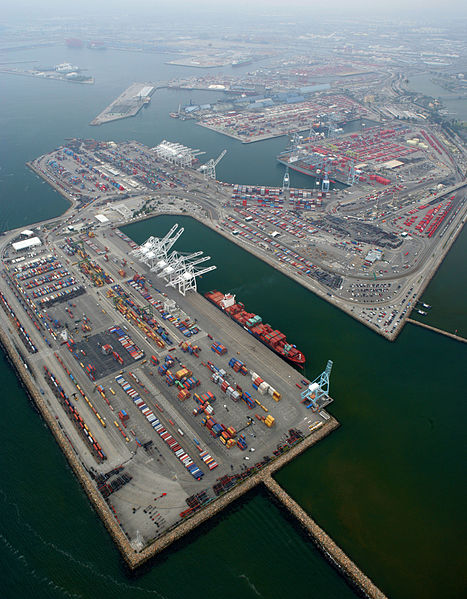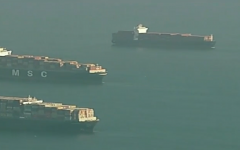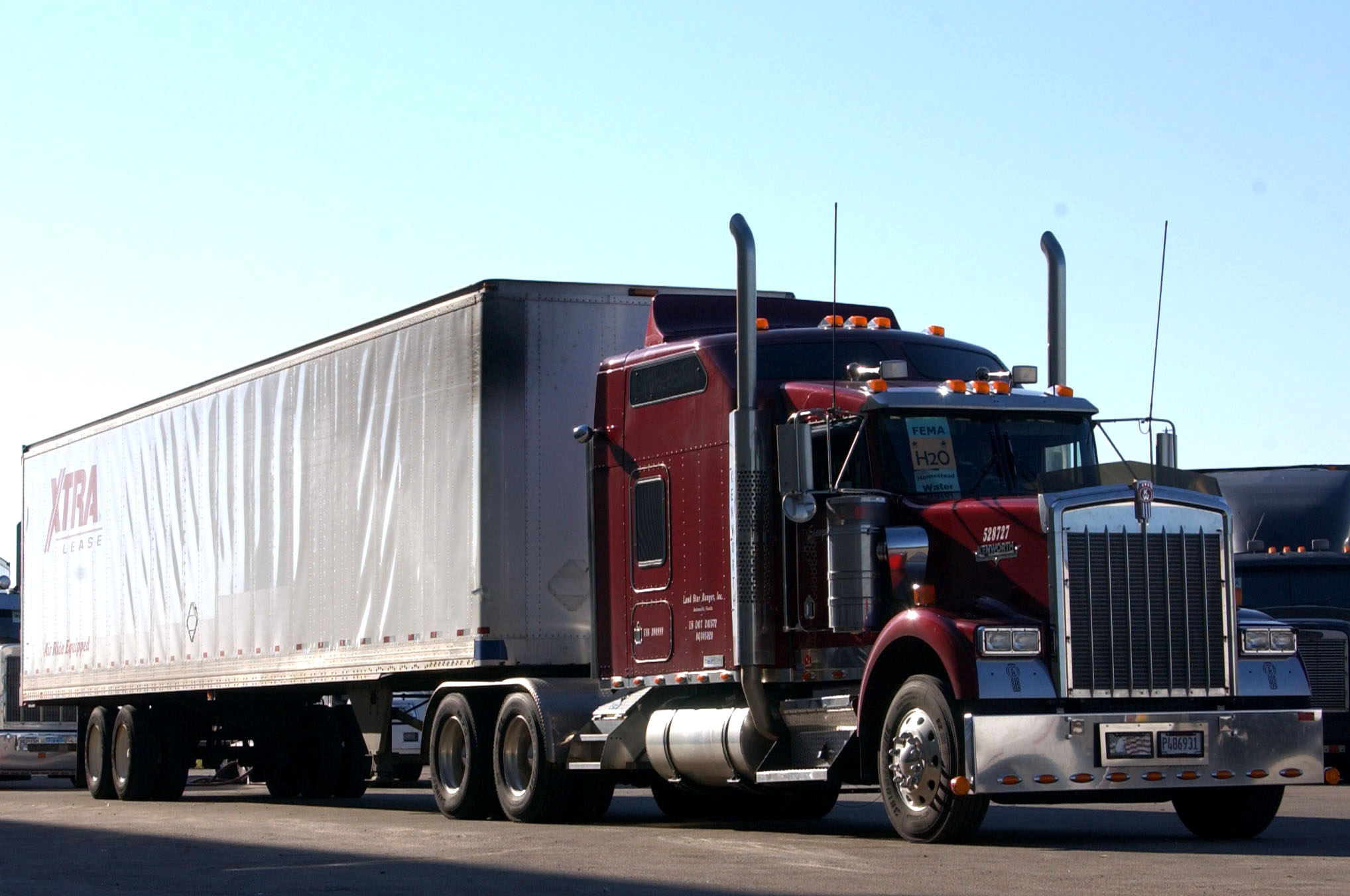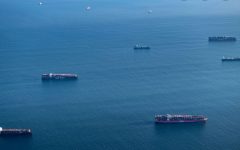
Port of Long Beach, CA. (Photo: USDHS via wikimedia commons)
Ports of LA, Long Beach To Start Charging Shipping Companies If Containers Are Not Moved Out Of Port Quickly
‘Shipping companies have no real option but to store the containers there because the port is slow to unload’
By Evan Symon, October 26, 2021 11:29 am
According to a statement by the Ports of Los Angeles and Long Beach on Monday, shipping companies are to receive large fines if their cargo stays too long on port grounds, with storage areas for containers rapidly shrinking in the past weeks.
Beginning November 1, 2021, containers that are to be shipped out by truck will only be allowed to stay at marine terminals for nine days before fines start, with containers going out by rail having only three days to move out.
For containers that stay in port beyond that time, the shipping companies will be charged $100 for each container, with the fine being instituted each day until they are moved out.
A large amount of idling cargo at ports has led to critical space constraints in the past weeks, with around 40% of all cargo at the ports being either containers slated for truck pick-up staying for more than 9 days and containers waiting to go out by rail for more than 3 days. Pre-pandemic, the large majority of containers only stayed in port for four days before being picked up by truck and only two days for those going out by rail. However, the flood of ships caused by the reopening of ports, a backlog of shipping orders, and a delay in modernizing port systems led to the large pileups of ships off the coast of Southern California. Currently, over 100 ships are still waiting to unload containers, with many more on the way, in part fueled by the upcoming holiday season.
Both ports claim that containers for local delivery normally sat at marine terminals for less than four days, while containers set to be carried by trains remained for less than two days, prior to the COVID-19 pandemic. Since then, the time it takes for containers to be transported from their ports has increased significantly.
“We must expedite the movement of cargo through the ports to work down the number of ships at anchor,” noted Port of Los Angeles Executive Director Gene Seroka on Monday. “Approximately 40% of the containers on our terminals today fall into the two categories. If we can clear this idling cargo, we’ll have much more space on our terminals to accept empties, handle exports, and improve fluidity for the wide range of cargo owners who utilize our ports.”
Port of Long Beach Executive Director Martin Cordero also added that “With the escalating backlog of ships off the coast, we must take immediate action to prompt the rapid removal of containers from our marine terminals. The terminals are running out of space, and this will make room for the containers sitting on those ships at anchor.”
The daily fines are only the latest measure to help alleviate the cargo and cargo ship backup currently plaguing the ports. Last week, Governor Gavin Newsom signed an Executive Order opening up more cargo storage space in and around ports, as well as removing some trucking weight restrictions, and instituting better loading and unloading flow measures. President Joe Biden also ordered the ports to stay open 24/7 to better deal with the crisis and instituted a Department of Transportation task force to look over the issue.
$100 fines per day per container if not sent out in time
The presidential task force, named the Biden-Harris Supply Chain Disruptions Task Force, partially helped create the container fine policy announced on Monday.
“I support the actions taken by the ports of Los Angeles and Long Beach today to charge ocean carriers for lingering containers on marine terminals. These actions aim to expedite the movement of goods and reduce congestion in our ports,” explained Biden-Harris Supply Chain Disruptions Task Force Port Envoy John D. Porcari on Monday. “As our economy continues to grow, increased demand and disruptions caused by the pandemic are putting our supply chains to the test. While we’ve seen new records set in terms of throughput this year at West Coast ports, we need more players throughout the supply chain to keep stepping up. The federal government will continue to bring together private companies and stakeholders from across the supply chain and serve as an honest broker helping to surface solutions like this to address supply chain disruptions.”
However, many truckers, whose industry has been partially blamed for the backlog, remained skeptical Tuesday that the threat of fines would do anything to deter shipping companies from leaving cargo idle on docks for long periods of time.
“Those ships need to turn around fast, and you can’t significantly speed up the process if the ports aren’t doing anything to help more of us go through,” William Brady, a truck driver who often comes through the ports, told the Globe on Tuesday. “A lot of us have just been sitting outside of ports ready to take containers out all day. Look outside a port and there are tons of us just waiting all day. Literally all day.”
“It’s not a matter of getting more trucks in there. We need that. It’s the unloading speeds and creating a better way for us to move in and out. The fines make no sense because they are punishing the shipping companies who have no real option but to store the containers there because the port is slow to unload, slow to let trucks in, and slow to get freight train containers through. They’re literally being fined for something that isn’t their fault.”
All penalty fees collected from the new measure are to be invested into programs designed to increase efficiency in ports.
- Bill to Require Law Enforcement Disclosure if AI Was Used To Help Write Reports - August 7, 2025
- Gov. Newsom Files FOIA Request To ‘Expose True Cost’ Of L.A. Federal Troop Deployment for Anti-ICE Riots - August 6, 2025
- California Redistricting: How Newsom’s Plan Will Demolish Hard Fought GOP Gains - August 6, 2025





Maybe shipping companies should avoid California ports because Democrats have so mismanaged the state? Florida and other states would be able to ensure that the ship containers are promptly unloaded?
Great suggestion Samantha!
While that sounds like a good idea the problem is that most of the goods coming into the U.S. are manufactured in the Pacific Rim. The cost of shipping them to East Coast posts is the trip through the Panama Canal or around the Horn of South Africa. Either would be time and cost prohibitive. The better alternative would be to get our elected officials to actually do what we elected them to do.
Completely unclear as to why the shipping companies must pay a penalty?? There are no truck drivers to haul these containers to their destination; maybe they should start dumping them in the Pacific instead??